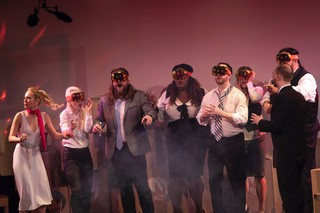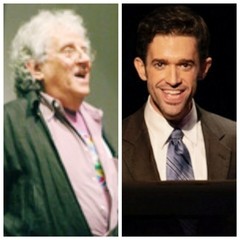|
Back
Rake’s Progress: The 2018 Edition New York
Symphony Space
04/09/2018 -
Eric Salzman: Big Jim and The Small-Time Investors (World Premiere)
Scott Joiner (“Big Jim” King), Aaron Theno (Stan), Darynn Zimmer (Mom), Jessica Fishenfeld (Kim), Benjamin Bloomfield (Pastor, Journalist), Helena Brown (Dolores, Zelda), Alex Frankel (Investor, Preacher), Jami Leonard (Samantha, Laeticia etc), Allison McAuley (Investor, Widow etc), Blake Burroughs (Investor, Police Officer etc)
Orchestra: Denise Koncelick (Accordion), Justin Hines (Percussion), Opus 87 Piano Quartet: Francesca Abusamra (Violin), Dudley Raine (Viola), Tyler James (Cello), Brian Daurelle (Keyboard and electronics), Victoria Bond (Conductor)
J. Griffith Brown (Director), Tuler Learned (Lighting Designer), Abby Walsh (Scenic Designer)

J. Fishenfeld/Investors (© Travis McGee)
“No eye his future can foretell
“No law his past explain
“Whom neither Passion may compel
“Nor Reason can restrain.”
W.H. Auden, from The Rake’s Progress
While Eric Salzman was known as composer, author, the creator of “musical theater” and an icon in American music, some of us knew him as the most trenchant and perceptive American music critic since Virgil Thomson. Not only were his ears all-hearing, all knowing, but his eye and mind hummed and vibrated, were literally in tune with American feelings and concepts. And for more than 60 years (he died last November at age 84), he never lost the American ethos–warts and all.
Stravinsky and Auden had to go back 300 years for Rake’s Progress. Salzman’s concept, and his libretto with Ned Jackson placed their opera today, taking on all those venal curiosities of American life in his last work, Big Jim and The Small-Time Investors. Greed and avarice, hucksterism and holograms, manic televangelists and moral turpitude, all became transformed into a sardonic, wicked, yet strangely appealing “musical theater” piece last night.
The music was eclectic (everything from Yiddish melodies to a delicious tango). And the libretto gave more than a picture of a con-man. The eponymous “Big Jim” becomes a charming, all too human con-man.
Having lived in several questionable capitals of the world, this writer has become familiar with confidence tricksters, and their tricks are simple. Believe in your tricks, never take your eye off the goal, and always be sincere–even when you don’t mean it!!
So here are a group of (equally eponymous) small-time investors invading the carton-packed mansion of their nemesis, having lost all their money. “Where’s Jim?” they question, they plead, they canonically sing.
Lo and behold, Jim does appear–yet this is 2017, so he appears as a hologram (actually with a frame over his face). He goes back in history, to show his scheme for a “virtual reality machine” (actual virtual reality glasses), he pleads for their money. And they are still suspicious until...
Ah, the American solution: Mother. “Mom” comes by, tells them her son is a good boy. And that’s enough. They invest. Jim makes his fortune, marries beauty queen Jill, loses their money, loses his soul, gains it and...
The Rake progresses.
Big Jim’s two acts could be combined in one. Not that it is too long, but because the zestiness, the enthusiasm, the love-hate continues at an inevitable good pacing. Not frenetic (like that other money-grubber opera, Gianni Schicchi), but with episodes which calibrate into each other so well that a break in the story is a break in our interest.
The tension is unending in Act I, so even the ironies (we know that the investors will be screwed) are looked on with fascination. In Act II, when one appealing character actually dies, many in the audience laughed. The tension had been broken.
The driving forces for the show were first, J. Griffith Brown’s fine direction. He knows to fill the stage or keep it alive during duets. The actors have multiple parts, as commentators, as individuals. Nothing sags.
Second Victoria Bond’s equally frisky conducting, with a unique amalgam of electronics, percussion, accordion (Mr. Salzman loved that instrument) and piano quintet. Folkish, classical, with American rhythms and colors.

E. Salzman, 1911/S. Joiner as hologram
(© Center for Contemporary Opera/Travis McGee)
Third, of course, with some terrific singing. Scott Joiner as Jim has a tough job competing with the raucous protestors (some with baseball bats!) but he works into his part with a tenor which can build into a shriek, exhortation and a fairly sympathetic duet with Mother, herself a very sympathetic Darynn Zimmer.
Then we have Jim’s friend, manager (and as we learn, in the final line), one of his victims. Aaron Theno has a resplendent baritone, was more the actor and reciter (and a frequent substitute for Greek chorus), and very impressive indeed. As was the winner of the beauty contest for the hand Big Jim himself, Jessica Fishenfeld.
My favorite in a five-minute cameo from the 80-minute work was Benjamin Bloomfield, as the Big Time Church Pastor, who gives marriage sings the marriage vows to Joiner and Fishenfeld with leers, prurient singing, the typical American con-man who hides his culpability with a robe and a church and greasy smile.
Yet the whole cast deserves plaudits here, for this was a work which never lost its sting. True, the sting was never fatal: Mr. Salzman was more Mark Twain than Ambrose Bierce or H.L. Menken. Instead he presented a contemporary rake/roué, with music just clever enough to fit the very clever scenario.
CODA: Jean Sibelius once said, “Nobody ever erected a statue for a music critic”. True enough, but a monument of sorts was announced by Victoria Bond last night. The “Eric Salzman Award for New Music Theater Composition will be awarded annually to two composers”.
Nice idea, though the award specifies that one of the composers must be a woman. (Yawn). Why not one winner should an Albanian? Or gay? Or straight? Or freckled? Or even a Jewish-American?
Or even (hold your breath, and the award goes to...) two deserving composers. Still, good luck to all the competitors.
Harry Rolnick
|